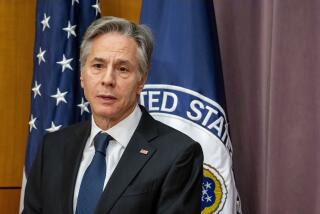Clinton Going to Moscow in January for Summit : Russia: U.S. Secretary of State Christopher gives Yeltsin a message from the President of ‘strong support’ for political and economic reform.
- Share via
MOSCOW — The United States and Russia announced Friday that President Clinton will visit Moscow in mid-January for a full-dress summit meeting with Russian President Boris N. Yeltsin.
“President Clinton will come to Moscow because the Russian people have chosen democracy and market economics over the failed legacy of communism,” Secretary of State Warren Christopher said after meeting with Yeltsin at a hunting lodge 80 miles northwest of the capital.
He said he gave Yeltsin a personal message from Clinton “reaffirming . . . the strong support of the United States for political and economic reform in Russia.”
Yeltsin, who met Christopher between planning sessions for a political campaign to elect a new Parliament, was clearly “thrilled” by the message, a senior U.S. official said.
By announcing the summit meeting now, only seven weeks before the election, Clinton apparently hoped to remind Russians of his high regard for their president--and to call Americans’ attention to one area where his foreign policy has enjoyed some early success.
“It does remind everyone that our foreign policy is much broader than some of the issues we’ve been dealing with lately,” White House Press Secretary Dee Dee Myers said in Washington, referring to the Administration’s struggles in Somalia and Haiti.
Clinton’s visit to Russia will come after he attends a summit meeting of the North Atlantic Treaty Organization in Brussels on Jan. 10 and 11. The exact timing is up in the air because Clinton is also considering a visit to Berlin or another European city, as well as a stop in another former republic of the Soviet Union, officials said.
The trip will be Clinton’s first to Russia since he took a package tour to Moscow as a Rhodes scholar at New Year’s in 1970--a trip that became a matter of controversy when then-President George Bush criticized it during the 1992 election campaign.
Clinton and Yeltsin have met twice this year: in Vancouver, Canada, in April and again in Tokyo in July.
“I’ve been there in January before,” Clinton joked to reporters at the White House, recalling his student visit. “It’s light about four hours a day. . . . It shows you my timing.”
Christopher was effusive in his public praise for Yeltsin, and told the Russian leader--before television cameras--that Clinton is “full of admiration for what you’re doing here, and . . . enormously appreciative of your courage.”
Later, asked by reporters whether his comments signaled U.S. support for the slate of Yeltsin supporters who are running in the Dec. 12 election for Parliament, Christopher said, “I certainly didn’t intend to come here to support any of the parties.”
He said Yeltsin and other Russian officials assured him that the election will be “free, fair and open.”
Asked about Yeltsin’s decree outlawing several anti-democratic opposition parties, Christopher said: “This is certainly a matter for the Russian government and the Russian people to decide. . . . I do not regard that as an unreasonable choice.”
He said he told Russian Foreign Minister Andrei V. Kozyrev that “a free and critical press is a healthy ingredient for democracy and elections,” but he did not specifically criticize Yeltsin’s closure of opposition newspapers.
In other business, Christopher explained the Administration’s new policy on NATO membership to the Russians and won their endorsement.
Clinton is proposing that Russia and Eastern European countries that want to join NATO first participate in joint military planning with the alliance, leaving actual membership for some time in the future.
When he explained the idea to Yeltsin, the Russian president beamed and called it “brilliant,” said a senior U.S. official who was present.
Yeltsin had been worried that countries such as Poland and Hungary might gain early admittance to NATO, leaving Russia out in the cold.
“There’s nothing envisioned which will bring a new batch of members into the alliance . . . right away,” the official said.
The two countries also agreed on a new joint program to remove unexploded land mines from the battlefields of the Cold War in Cambodia, Afghanistan and elsewhere.
A U.S. official said an estimated 85 million land mines are buried around the world, injuring or killing about 150 people every week.
The two governments agreed to share mine-clearing equipment and technology.
The Russian military has developed “directed energy” devices, chemical foams and sonic detonators for mine-clearing that the United States is interested in using, the official said.
Yeltsin received Christopher at a rustic hunting lodge at Zavidovo that was a favorite retreat of Soviet leader Leonid I. Brezhnev during the 1970s.
The Russian president met with the secretary of state in a two-story solarium filled with semitropical plants, stuffed exotic birds and hunting trophies.
Yeltsin has sometimes retreated to the lodge, or dacha , to rest from ailments including a bad back, officials said.
But on Friday, he appeared vigorous and healthy as he outlined his plans for the election campaign, U.S. officials said.
“We are preparing to adopt a constitution that is up to the best standards of Western democracy,” he told Christopher, according to an official who was present.
“The only thing that remains is to rebury Lenin,” he proclaimed, half-joking.
The embalmed corpse of V. I. Lenin, the leader of the 1917 Bolshevik Revolution who died in 1924, has been on display in a mausoleum in Moscow’s Red Square, but Yeltsin supporters have proposed removing the body as a final break with the Communist past.
More to Read
Get the L.A. Times Politics newsletter
Deeply reported insights into legislation, politics and policy from Sacramento, Washington and beyond. In your inbox twice per week.
You may occasionally receive promotional content from the Los Angeles Times.








